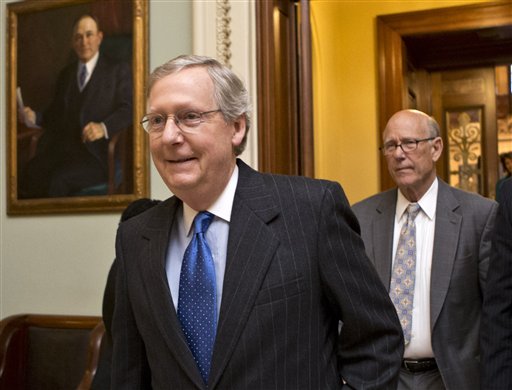Now that Senate Minority Leader Mitch McConnell has helped forge a path off the fiscal cliff by corralling Republican support for making Bush-era tax breaks permanent for all but the top 2 percent of American taxpayers, he pretends to think that he and his party are off the hook on reform of business taxes. He has spent most of the past week saying that now that President Barack Obama has gotten a tax increase on the wealthy, other tax reforms are off the table - and that it's time to cut spending on the earned entitlements, Social Security and Medicare.
His turn-around was predictable, but it's wrong. The biggest problem isn't spending; it's the decline in tax revenue, which is at a 60-year low of barely 16 percent of gross domestic product, well below the average level of 18-to-18.5 percent of GDP. A large portion of the slide owes to the Great Recession of 2007-2009, but it also reflects business tax loopholes, tax preferences and a range of other gimmicky tax expenditures for business interests.
These loopholes and tax expenditures carry a cost estimated at $1.1 trillion in lost tax revenue, or in shifts of tax burdens to other taxpayers. Until the loopholes are closed and business taxes are broadened, lowered and leveled, Washington can't begin to pull the country out of excessive national debt. It certainly would be premature, and unfair, to make earned entitlements the next subject for cutting.
President Obama, in fact, agreed to spending cuts, in the 2011 debt-ceiling deal, that would trim federal debt in scheduled future spending by more than $1.2 trillion over the next decade. Yet Republicans, for all their talk before the November elections about closing tax loopholes, have yet to specify a single tax loophole they would eliminate.
It's not hard to see why. Most members of Congress routinely trade political protection for business lobbyists and their crafty loopholes in return for campaign contributions and political support. Once they began talking about closing tax loopholes for businesses and corporations that make their tax-filing departments profit centers, lobbyists bombarded them.
Yet putting off tax reform just allows the myriad problems imposed by the flawed tax system to grow, annually worsening the damage to the U.S. economy and our job base. The cost of uneven tax breaks, loopholes and tax expenditures hurts economic productivity and growth. It fuels the off-shoring of jobs and associated tax losses and growth of off-shore, untaxed profits. And it constrains the competitiveness of the United States' industrial base.
The current statutory U.S. rate of 35 percent for corporate taxes, though among the lowest in industrialized countries when it was set, is now the highest. Still, the effective marginal rate paid by most companies after deductions for tax loopholes and expenditures hovers around 32 percent, the average for other major industrialized G7 countries. But it still doesn't compare in equity to the broader-based, lower rates elsewhere.
Loopholes and special tax breaks further create incentives for tax planning and avoidance that distorts economic efficiency, and that causes different sectors of the economy to pay substantially differentiated tax rates. Effective corporate tax rates, for example, range from 14 percent for utilities, to 19 percent for transportation and warehousing, to 31 percent for construction, and wholesale-and-retail trade.
U.S. tax loopholes also create a tax preference for businesses to finance growth by borrowing and creating debt rather than using equity, simply because interest payments on debt get better tax treatment. So businesses create financial risks for themselves by incurring debt which makes them more vulnerable to failure or bankruptcy, and thus more risk averse to investments and growth. Loopholes also create tax advantages for specially organized entities and tax-avoidance "pass-throughs," thus creating more complexity in tax filings, regulation and additional losses of tax revenue.
Indeed, the nation's business tax structure has become such a regulatory hodge-podge and smorgasbord that the IRS can't enforce it, and can't tame it. Only a full-blown overhaul will eliminate the complexity, duplicity and burdensome inefficiency that the current system imposes on the the U.S. economy. But Republicans will have to support reform before it can occur.

